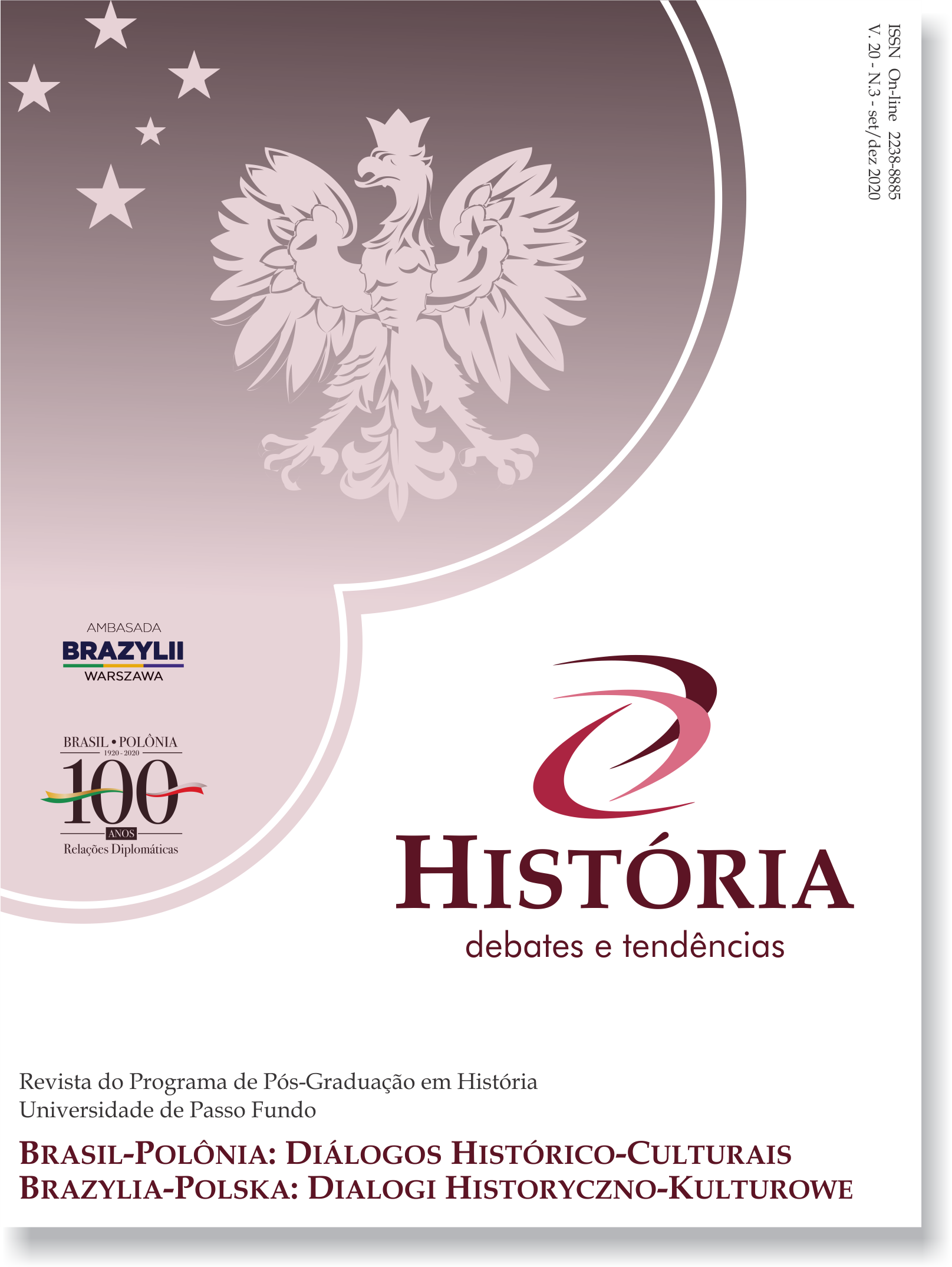The Central Union of Poles in Brazil and the national cultural imposition (1930 - 1938)
DOI:
https://doi.org/10.5335/hdtv.20n.3.11652Keywords:
Polish. Sociability, Networks, NationalizationAbstract
This article aims to analyze the Central Union of Poles in Brazil, in his perspective of promoting ethnic culture, as a way of maintaining Polish nationality in ethnic groups and the compulsory closure through nationalization, as a form of promoted cultural imposition by the ideological political instances of the Estado Novo in Brazil. The organization of ethnic institutions had been important for the propagation and maintenance of a culture brought with immigrants, however, transformed and updated in the cultural spaces of insertion, with decisive inferences both from the Polish governmental bodies, in the promotion of ethnic culture among the immigrants who here were, how much, of the Brazilian nationalizing processes in the Era Vargas. To write this article, consular documentation of the Polish MSZ from 1938 was analyzed, as well as articles from ethnic journals circulating in Polish immigration centers in Brazil. However, the historical investigation of ethnic institutions demands some care in the appropriation of meanings and organizations of the possible information from the research sources. The history of broader sociability institutions or networks is not based on simple analysis of documents, whether official or from any other sources. One may question, above all, whether historical knowledge can provide truths. For Reis (2000, p 325), there are several challenges that put historical truths in perspective: knowledge is linked to the time of production and the author's subjectivity; truths unverifiable by experience and sources produced and manipulated according to the directed expectations. For Foucault (2000, p. 14), ideology itself is the truth represented in a power relationship perspective, in the so-called regimes of truths and in their representations.
Downloads
References
BOURDIEU, Pierre. O poder simbólico. Lisboa: Difel; Rio de Janeiro: Bertrand Brasil, 1989.
CHARTIER, Roger. O mundo como representação. Estudos Avançados, São Paulo, v. 5, n. 11, p. 173-191, abril de 1991.
FOUCAULT, Michel. Microfísica do Poder. Rio de Janeiro, Graal, 2000.
GARDOLINSKI, Edmundo. Escolas da Colonização Polonesa no Rio Grande do Sul. Porto Alegre: Escola Superior de Teologia São Lourenço de Brindes: Caxias do Sul, UCS, 1977.
GELINSKI, Pedro. Et Al. 75 Anos de presença dos Padres Vicentinos. Curitiba: Gráfica Vicentina, 1978.
GÅUCHOWSKI, Kazimierz. Os poloneses no Brasil. Porto Alegre: Rodycz & Ordakowski, 2005.
KRASICKI, Marek. Sytuacja Polonii brazylijskiej w dobie ustaw nacjonalistycznych prezydenta Getulia Vargasa. Dzieje Polonii w Ameryce ÅaciÅ„skiej. WrocÅ‚aw, v.3 n. 5, pp. 411-441, 1983.
KULA, Marcin. Brazylijski żetulizm jako ustrój autorytarny. Dzieje Najnowsze, n. 1, pp. 117-129, 1978.
MALIKOSKI, Adriano. Escolas étnicas polonesas no Rio Grande do Sul. Caxias do Sul: EDUCS, 2018.
MAZUREK, Jerzy. A Polônia e seus emigrados na América Latina (até 1939). Goiânia: Espaço Acadêmico, 2016.
REIS, José Carlos. História e Verdade: proposições. Síntese: Revista de Filosofia. Belo Horizonte, v.27, n. 89, fev. /jun. pp. 1-33, 2000.
SILVA, Fabiana Regina da. Associações Polonesas União das Sociedades Kultura e OÅ›wiata (Curitiba - PR): Antagonismos e polonidade (s) na diáspora (1890 1939). Tese de doutorado do Programa de Pós-Graduação em História da Universidade de Federal de Santa Maria. Santa Maria: UFSM, PPGH, 2019. 394 p
VIEIRA, Carlos Eduardo. Intelligentsia e intelectuais sentidos, conceitos e possibilidades para a história intelectual. Revista Brasileira de História da Educação. Londrina: n° 16 jan./abr., pp. 63-85, 2008.
IANNI, Otavio. A formação do proletariado rural no Brasil. In: STEDILE (Org.). A questão agrária no Brasil: o debate na esquerda: 1960-1980. São Paulo: Expressão Popular, 2005. p. 127-144.
WACHOWICZ, Ruy Christovam. As Escolas da Colonização Polonesa no Brasil. Curitiba: Ed Champagnat, 2002.
WACHOWICZ, Ruy Christovam. O camponês polonês no Brasil. Curitiba: Fundação Cultural, Casa Romário Martins, 1981.






